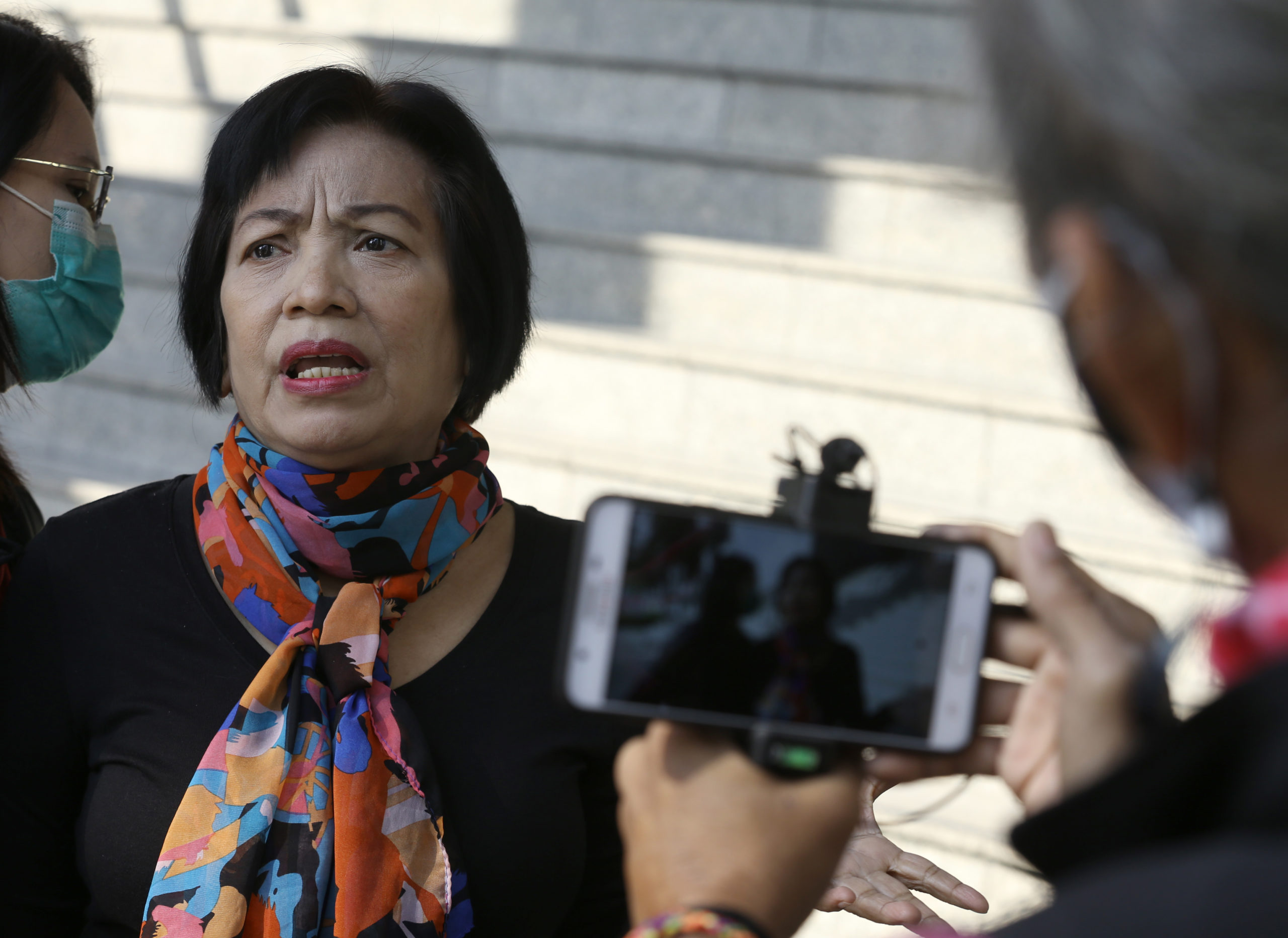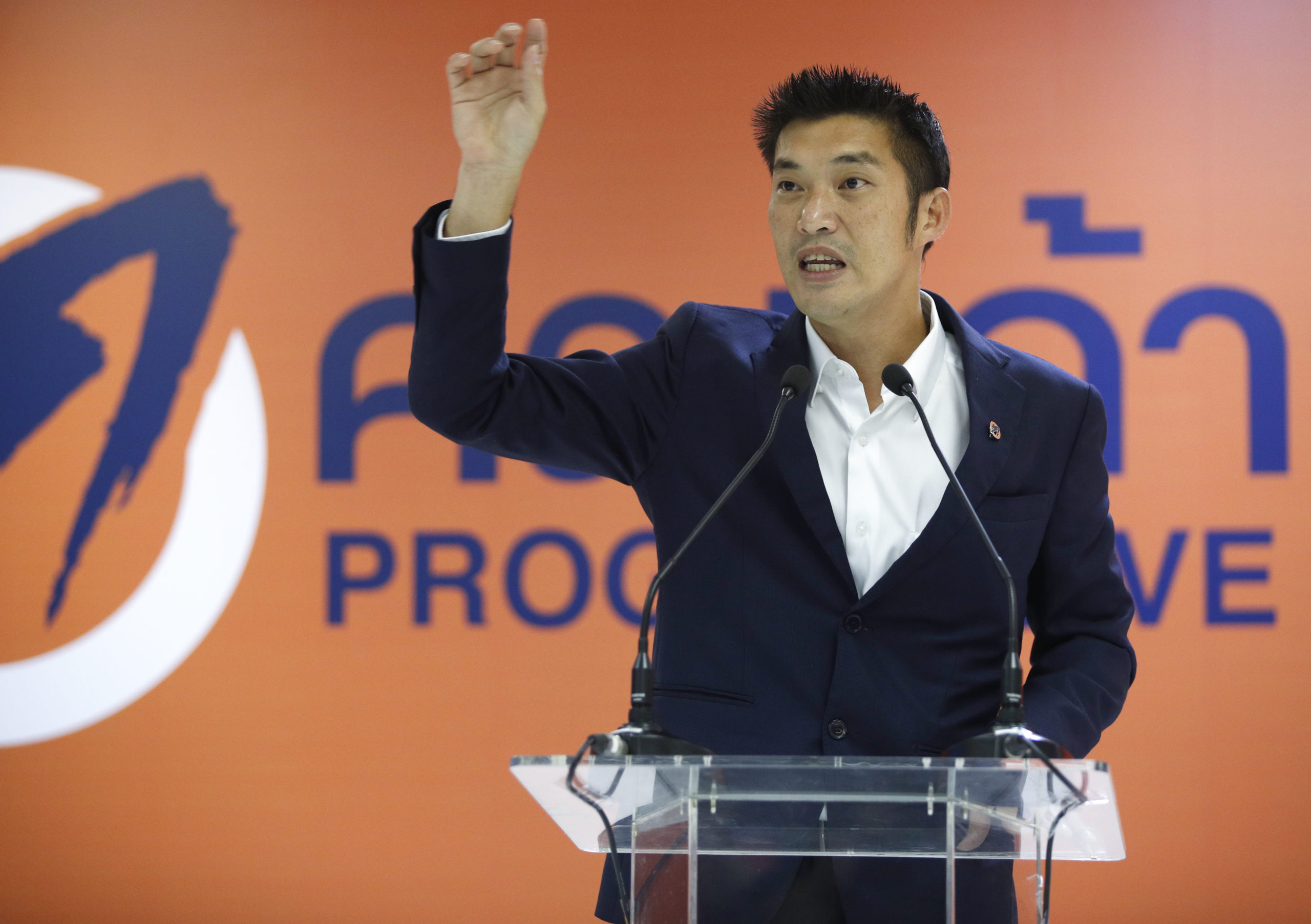The number of recent lèse majesté cases in Thailand have soared to near 60, as prominent former Future Forward Party leader Thanathorn Juangroongruangkit and a retired former civil servant made headlines over the past week.
Thanathorn’s lèse majesté case came after the 42-year-old auto parts billionaire ran a live broadcast that questioned the capacity of the King Maha Vajiralongkorn-owned Siam BioScience in producing coronavirus vaccines in Thailand. The allegations stem from Thanathorn’s suggestion that the Thai government should not base its entire Covid-19 vaccine strategy on a biopharmaceutical company that had limited experience in vaccine making. The lèse majesté charge and a Computer Crime Act violation were both filed by the Ministry of Digital Economy and Society on January 20.
65-year-old Anchan Preelert, who was found guilty on 29 counts of violating Thailand’s draconian Article 112, was originally sentenced to 87 years, but as is custom, the sentence was reduced by half because she pled guilty to the charges. Anchan posted audio clips from a podcast to both Facebook and YouTube with comments that were deemed critical of the Thai monarchy.
Back in November, Thai Prime Minister Prayut Chan-o-cha warned that “all laws, all articles” would be used against protesters “who broke the law”, including the acceleration of Article 112 charges. The escalation of lèse majesté charges against people voicing criticism of both the government and its use in the defence of a private company almost wholly-owned by Vajiralongkorn is a startling reflection of a regime with deep insecurities.
While the conviction of Anchan and the politically-motivated charges against Thanathorn come at a period of relative calm in the pro-democracy movement in Thailand, the incentive to escalate criminal charges against dissenters has been a long-term strategy, one based on the securitisation of Thailand’s opposition figures.
Securitisation is a process where issues, such as pro-democratic movements in Thailand, are labelled as security concerns by authorities and removed from the normal political space, where issues of national security are implemented.
In Thailand, and in many other countries, the policy-making or decision-making processes subvert democratic means. Rhetoric is shaped in a way that reinforces an existential threat until public involvement in the policymaking process is no longer deemed necessary. Thailand has nurtured a perceived threat to its monarchy for decades – with coups justified in the name of royal preservation.

With the elite in Thai society, they portray opponents and political movements as ‘enemies of the Thai state’ because they have spoken out against or assailed the government or the monarchy
Exiled Thai academic Pavin Chachavalpongpun once highlighted the need for regimes of the past to create dichotomies and cleavages between themselves and their enemies. With the elite in Thai society, they portray opponents and political movements as “enemies of the Thai state” because they have spoken out against or assailed the government, the monarchy, or the very nature of what it means to be Thai.
These dichotomies were fuelled at times by misinformation, as was the case with the 1970s student movements, and at times by vague statements from the targets of charges themselves. Former Thai Prime Minister Thaksin Shinawatra, as Pavin notes, did himself no favours by calling for monarchical reform in 2009, speaking of a “shining” new age after the death of Bhumibol Adulyadej.
This tradition continues today. Thanathorn’s Future Forward Party was accused of trying to overthrow the monarchy in a dismissed Constitutional Court case, and he broke a social taboo by questioning the royal budget, both of which have rung alarm bells among royalists.
The Future Forward Party also opposed an October 2019 emergency decree that granted Vajiralongkorn personal control over two army units, the 1st and 11th Infantry Regiments to the king’s Royal Security Command noting that it did not “follow the laws of the constitutional monarchy”. Both the Pheu Thai and Puea Chart parties voted in favour of the decree.
Acrimony between parties has led to royalist and pro-military parties portraying the opposition Future Forward party as a threat to the monarchy. Of course, Thanathorn has faced legal challenges before. His Future Forward Party, which won 81 out of 500 seats in Thailand’s lower house, was dissolved by the politically-conflicted Constitutional Court because it supposedly received illegal funds from Thanathorn.

Thailand’s National Security Policy and Plan foresaw domestic threats outpacing external threats back in 2019. Domestic issues, such as those currently facing the monarchy and recent calls by protesters for the resignation of Prayut, have been emphasised as more important national security concerns.
The National Security Policy and Plan document targets activists and pro-democracy advocates as “providing false information and spreading misunderstanding to undermine the national institution”, as well as having a lack of “correct awareness” and “importance” of the monarchy as “the national soul of the country”.
The previous national security document had voiced concern about the use of lèse majesté and its impact on human rights. In anticipation of additional domestic threats, the National Security Plan encourages state agencies and institutions to use a broad series of measures to safeguard and strengthen the monarchy.
The anticipation of resistance to monarchical dominance in Thailand is nothing new, and as evidenced by the National Security Policy and Plan, is a large part of the on-going securitisation of the political opposition.
In an October 2019 speech, then Royal Thai Army Chief Apirat Kongsompong accused academics and other leftists of planting “communist chips” in to the minds of brainwashed youths, also saying members of the political opposition – including Thanathorn – were plotting with Hong Kong pro-democracy activist Joshua Wong to undermine national security. Prior to 2019, the NCPO interpreted otherwise ordinary criticism as criminal disinformation, sedition, and as threats to national security.
As long as the monarchy and lèse majesté are viewed in terms of national security, no attempt to pressure the government to comply with international law will be successful
Securitisation is often accompanied by fears of existential threats to institutions of power, or as in the case of Thailand, a breakdown of the Thai hierarchical system that threatens the monopoly of power held by the military-monarchy alliance.
The political status quo has maintained that domination through a long-standing conservative notion of national identity, with the monarchy at the centre of a nationalist triumvirate – nation, religion, and king. It is unclear how this identity applies to the current generation, who are less connected to opposition political parties or movements, and have fewer social and emotional ties to the monarchy than previous generations.
The acceleration of lèse majesté charges should not be viewed as a new strategy employed by this military-affiliated government. Prayut has often said that Vajiralongkorn had instructed him not to use Article 112, however the government had already employed other draconian measures to silence critics, such as sedition or computer crimes charges. Whatever the risk, by continuing to securitise the opposition and deploy lèse majesté as a political weapon, is that the strategy will backfire and lead to further resentment toward the monarchy.
Activists and human rights advocates have already begun to question the integrity of law enforcement and their indiscriminate use of Article 112. King Vajiralongkorn and the military-backed government are now beset by multiple challenges, learning that legitimacy cannot always be inherited, with growing public animosity at government ineptitude and lingering economic inequalities only made worse by Covid-19.
For now, Thanathorn and Anchan seem to be destined to share the same fate as less recognisable Thais – including a 16-year-old boy who ‘made fun’ of the king by dressing like him – who are victims of this securitisation process.
As long as the monarchy and lèse majesté are viewed in terms of national security, no attempt to pressure the government to comply with international law will be successful, nor will attempts by anti-dictatorship protesters force the regime into compliance. Delinking the monarchy from national security is a complicated task, as conceptions of image and national identity have historically been linked together. Other securitisation processes such as that of the global war on terror are more easily controlled or reinserted into the public discourse when circumstances change.
As long as the claims to power are an integral part of this conservative elite’s identity, lèse majesté and other draconian self-preservation tools won’t be relinquished so easily.


